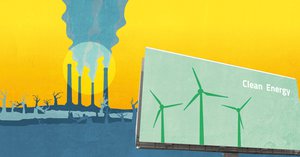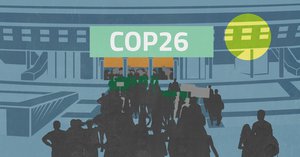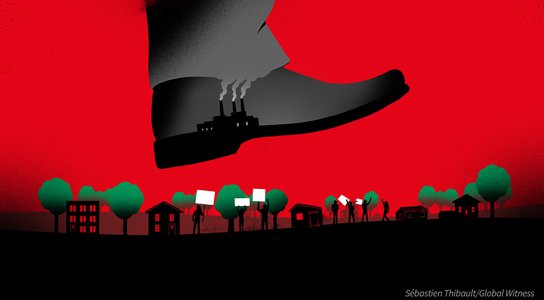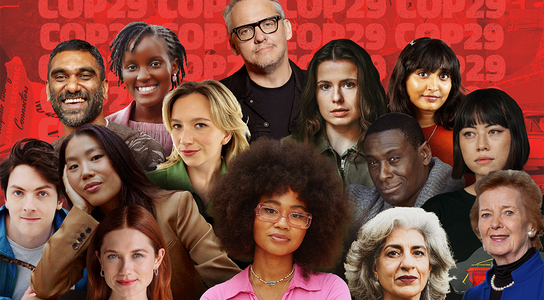Despite some successes, ultimately the 2021 Glasgow COP26 climate summit was true to form in that it let those responsible for the climate crisis off the hook, and left those most impacted by it waiting for meaningful climate action.

The last chance…until next time
Even in its framing, this year’s COP got off on the wrong foot. It was billed as the world’s “last chance to avert climate disaster”. But even this alarming summary fails to adequately diagnose the situation we are currently in. It is no longer the case that climate change is some looming future threat that global leaders need to act pre-emptively to head off. Rather, we are at a stage where leaders are having to play catch-up during an ongoing crisis, attempting to minimise the damage as much as possible.
During our time in Glasgow, we heard time and time again the disbelief and dismay from those protesting on the streets or pleading for action on podiums when the leaders they looked to for action stated that “the world is on the brink of an emergency”. For millions of people around the world, the emergency is already here. Through floods, fires, droughts, famine, people’s lives are already being destroyed by the impacts of climate change – and often, it’s those who had little or no part in causing this crisis who are suffering the most.
Judged on its own terms as the final chance to pull us back from the brink of climate catastrophe, COP26 was a failure. Commitments with delivery dates decades into the future, with no clear accountability or milestones for achieving them, are not appropriate responses to such a precipitous moment. Given the fact that this crisis is already upon us, the lack of urgency shown is simply unforgiveable.

Access denied
Access and representation has long been a contentious issue in climate talks. This year’s COP saw an unprecedented number of Indigenous voices, youth activists and defenders participating in the conference, raising their voices and demanding urgent change. Yet many more were shut out due to vaccine inequity, travel restrictions and high costs. Many activists and civil society representatives were unable to participate fully due to a range of logistical issues which plagued the conference, from massive queues to a shortage of entrance permits.
Even those who did manage to attend found themselves confined to areas far away from those in power. While our research found that over 500 fossil fuel lobbyists were welcomed into COP as delegates, free to make their case to global leaders in the negotiating rooms, those most affected by the climate crisis were left having to shout from the sidelines.

Fossil fuel failure
With corporate representatives of the fossil fuel industry flooding the venue, it’s not hard to see why such little progress was made on fossil fuels. The fact that the final agreement reached included an “unprecedented reference” to fossil fuels was hailed as a victory, a damning indictment of the previous 25 COP meetings if there ever was one. Some progress was made on agreements to reduce fossil fuel use, but other efforts fell far short of what was needed.
An agreement on coal lacked many of the countries most reliant on coal, and included nothing on oil and gas whose combined emissions now far exceed coal. Similarly, efforts to tackle methane - a powerful planet warming gas – were lacklustre and ignored the need for a phase-out of fossil fuels. Belatedly, COP26 participants agreed to accelerate their efforts to phase out “inefficient” fossil fuel subsidies – leaving the question open as to exactly how efficient pouring public money into making our environment increasingly uninhabitable can be.

Pledges, promises and propaganda
The early days of the conference were dominated by a plethora of pledges to end deforestation, from world leaders, companies, donors and financiers. Most notably, over 100 world leaders promised to end deforestation by 2030. Readers who have kept a close eye on previous climate negotiations may be getting a sense of déjà vu, since a similar thing was promised at a UN climate summit in 2014. The assembled governments also promised to halve deforestation by 2020.
Much like the 2014 pledge, the agreement announced at COP26 is entirely voluntary, and there was no clarity on exactly how the signatories will be held to account if they fail to live up to their promises (again). Conspicuously absent from pledges made by financial institutions were the banks we’ve previously found to be the biggest culprits for financing companies complicit in deforestation.

The final let-down
This summit was an opportunity for global leaders to stand side by side with those people whose lives have already been turned upside down by a warming climate, to build a legacy for future generations, to be remembered as the ones in power who finally recognised the need to act. Instead, the interests of big polluters and those complicit in the destruction of the natural world have won out on too many issues.
The commitments made at this year’s COP fall well short of what is needed – and by themselves would not get us anywhere near keeping global warming below 1.5 degrees. It’s important not to lose hope, but also to not feed into the brinkmanship which has failed to jolt those in power into action. Our leaders have shown us how they act when they are told it is the “last chance to avert climate disaster”. Their conduct will not be improved by telling them next year that “now this really is the last chance”.
Rather than imagining us hurtling ever closer to a cliff edge before some last-minute negotiations manage to slam on the brakes and save us all, our leaders must recognise that every day spent delaying action is making this ongoing crisis worse. Their inaction is not taking us closer to the brink, it is throwing more and more people over the precipice.
Any action that can be taken to limit the damage is worth taking – and the sooner, the better. To do this, world leaders need to stop listening to those who have caused this crisis and instead listen to the people desperately trying to fix it.


